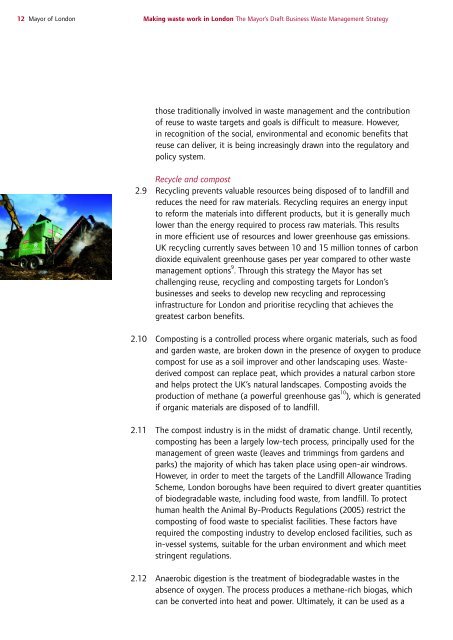Draft Business Waste Strategy PDF - london.gov.uk - Greater ...
Draft Business Waste Strategy PDF - london.gov.uk - Greater ...
Draft Business Waste Strategy PDF - london.gov.uk - Greater ...
Create successful ePaper yourself
Turn your PDF publications into a flip-book with our unique Google optimized e-Paper software.
12 Mayor of London<br />
Making waste work in London The Mayor’s <strong>Draft</strong> <strong>Business</strong> <strong>Waste</strong> Management <strong>Strategy</strong><br />
those traditionally involved in waste management and the contribution<br />
of reuse to waste targets and goals is difficult to measure. However,<br />
in recognition of the social, environmental and economic benefits that<br />
reuse can deliver, it is being increasingly drawn into the regulatory and<br />
policy system.<br />
Recycle and compost<br />
2.9 Recycling prevents valuable resources being disposed of to landfill and<br />
reduces the need for raw materials. Recycling requires an energy input<br />
to reform the materials into different products, but it is generally much<br />
lower than the energy required to process raw materials. This results<br />
in more efficient use of resources and lower greenhouse gas emissions.<br />
UK recycling currently saves between 10 and 15 million tonnes of carbon<br />
dioxide equivalent greenhouse gases per year compared to other waste<br />
management options 9 . Through this strategy the Mayor has set<br />
challenging reuse, recycling and composting targets for London’s<br />
businesses and seeks to develop new recycling and reprocessing<br />
infrastructure for London and prioritise recycling that achieves the<br />
greatest carbon benefits.<br />
2.10 Composting is a controlled process where organic materials, such as food<br />
and garden waste, are broken down in the presence of oxygen to produce<br />
compost for use as a soil improver and other landscaping uses. <strong>Waste</strong>derived<br />
compost can replace peat, which provides a natural carbon store<br />
and helps protect the UK’s natural landscapes. Composting avoids the<br />
production of methane (a powerful greenhouse gas 10 ), which is generated<br />
if organic materials are disposed of to landfill.<br />
2.11 The compost industry is in the midst of dramatic change. Until recently,<br />
composting has been a largely low-tech process, principally used for the<br />
management of green waste (leaves and trimmings from gardens and<br />
parks) the majority of which has taken place using open-air windrows.<br />
However, in order to meet the targets of the Landfill Allowance Trading<br />
Scheme, London boroughs have been required to divert greater quantities<br />
of biodegradable waste, including food waste, from landfill. To protect<br />
human health the Animal By-Products Regulations (2005) restrict the<br />
composting of food waste to specialist facilities. These factors have<br />
required the composting industry to develop enclosed facilities, such as<br />
in-vessel systems, suitable for the urban environment and which meet<br />
stringent regulations.<br />
2.12 Anaerobic digestion is the treatment of biodegradable wastes in the<br />
absence of oxygen. The process produces a methane-rich biogas, which<br />
can be converted into heat and power. Ultimately, it can be used as a
















